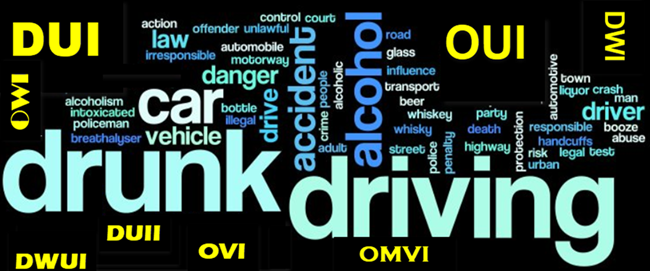DWI vs DUI: DWI Lawyer, DUI Attorney

By: DUI Lawyer GA William C. Head, Senior Partner of GeorgiaCriminalDefense.com, with local attorneys near me in Atlanta Georgia
Confused about the difference between DUI and DWI or between OVI and OUI? These are similar abbreviations for the same type of criminal laws. Since all are acronyms for drunk driving or drugged driving in various states, this article tries to convey the dizzying array of laws defining a drunk driving charge (or drugged driving).
The OUI acronym means “operating under the influence,” and OVI stands for “operating a vehicle under the influence.” OWI vs DWI means just about the same thing, except the “O” is for operating and the “D” is for driving.
This article explains why the United States is the only nation on Earth with more than one name for its driving under the influence laws. Simply stated, OUI vs DUI, or OWI vs DUI, or spending a good bit of time analyzing the difference between OUI and DUI overly complicates an issue that only exists in the United States: lack of uniformity of the nation’s driving intoxicated laws.

What DWI Stands For, and Where That Acronym Started
In 1906, New Jersey passed the nation’s initial DWI law. But their statute had no language about procuring a forensic test to determine BAC level. By 1910, two other states (New York and New Mexico) had passed driving while intoxicated laws. Quickly, the three-word phrase was shortened to the abbreviation “DWI.”
Soon, despite NJ, NM, and NY all using DWI, other states passed their own laws, with separate and distinct wording, penalties, and acronyms. Each acronym has become part of the vernacular in various states. Even today, when searching for a criminal defense lawyer well-versed in the motor vehicle crime of impaired driving, you would look for a DWI attorney in these states.
The difference between OVI and DUI. In the State of Ohio, OVI stands for operating a vehicle while intoxicated. So, you will need to search of an OVI attorney near me.
Their adjacent state of Pennsylvania uses DUI, and their northern neighbor, Michigan has OWI (operating while intoxicated) and OMVI (operating while visibly impaired). If you are in a state other than Michigan and you type in “OWI lawyers near me,”, you may get no Google results.
Searching for a DWI law firm. In the largest populated state in the nation using the DWI acronym, Texas, to find the best DWI attorney, possibly search for driving while intoxicated. This may help you narrow down your search for DWI attorneys near me in the Lone Star state.
Yet, while also using DWI for its state drinking and driving crime, the Tar Heel State calls its law, “driving while impaired.” So, use those words in seeking the best DWI attorney in North Carolina.
To add a little more confusion, the state of New York has both a DWI and a DWAI law. Their D.W.I. statute is worded as “driving while intoxicated.” The DWAI statute is called “driving while ability impaired.” Colorado also has a DWAI law, but their state acronym is DUI, for driving under the influence.
What DUI Stands for in Almost 40 States.
Today, DUI is the most prevalent abbreviation. DUI is the acronym for driving under the influence. It is the dominant abbreviation in 37 states.
DWI is the second most popular acronym, but different state laws are written as either “driving while impaired” (e.g., North Carolina) or driving while intoxicated (e.g., Texas). In all states, the loss of your driver’s license for some period is part of the punishment handed down when convicted.
Other states like Wisconsin and Indiana opted for operating while intoxicated, which is what OWI stands for. Massachusetts, Rhode Island, and Maine have established that OUI stands for “operating under the influence.”
Other states created their own unique acronyms, like Oregon. In that state, DUII stands for a similar-sounding crime. Their interpretation is that theirs is a “driving under the influence of intoxicants” law, in Wyoming, which says that DWUI stands for “driving while under the influence.” OVI stands for “operating a vehicle under the influence” in Ohio.

So, those familiar with the various state acronyms, he or she would know that “Portland OUI attorney” is talking about Maine, not Oregon, which uses DUII. For any DUI in Alabama, you would look for the best Alabama DUI lawyer.
Different Ways to Be Convicted of Driving Intoxicated or Driving Stoned
If you were arrested for impaired driving due to alcohol only, two types of charges are usually accused. The first is generally called drunken driving or driving intoxicated. Many of these cases are built from circumstantial evidence, like your performance on field sobriety tests.
Where the blood alcohol content was over the legal limit, drunk driving cases get accused of both exceeding the legal alcohol level AND for being too impaired to drive by whatever ethanol was in your body. This second type of DUI case is usually supported by one or more roadside evaluations called “field sobriety tests.”
Driving under the influence of drugs has skyrocketed in the past 50 years. This has led to the passage of drugged driving laws, and harsher punishments (like lifetime license revocation for a repeat DUI-drugs offender) in some states, like West Virginia.
1. Traditional, common law DWI – your arresting officer gathers evidence to support his or her “opinion” that you had consumed too much alcohol to drive safely. This type of DWI-alcohol impairment case does not require any breath, blood, or urine test, and (possibly) no field sobriety tests, and still be charged with driving drunk.
In states where refusal to submit to testing is still permitted (e.g., Mississippi, Florida, Connecticut), these “traditional” alcohol impairment cases are common. In other states (e.g., Georgia, Arizona, California, Michigan, and Indiana), police have statutory authority to obtain a judicial search warrant and will use physical force and restraints to take a forcible blood or urine test (by catheter) if you refuse to voluntarily submit to field sobriety tests.
2. “Per Se” DUI-DWI – is based upon a “reading” or result from a blood test, breath test, or urine test indicating that you had consumed enough alcohol to put you at or above the state’s legal limit. For example, a driver under age 21 stopped in Georgia is allowed up to a 0.02 reading, whereas a driver in Georgia who is age 21 or more (who is not operating a commercial motor vehicle) can have up to a 0.08 reading.
The crime of DUI centers on operating or being in actual physical control of a motor vehicle while consuming or after consuming alcohol, drugs, or noxious vapors. This can be noxious vapors from airplane glue, gasoline, toluene, or mineral spirits. All states have DUI marijuana laws, too, but with recent decriminalization efforts in many states, these statutes have been updated to add what quantity of nanograms of THC can be in a person’s system.
The drugs causing impairment can even be your own prescribed medications, especially if you have also consumed alcohol. This is called “DUI combination” in legal circles because the citizen has combined two CNS (central nervous system) depressants.
Is a DUI a Felony? Misdemeanor vs Felony Explained.
Until arrested for DUI charges, most people know very little about either DUI or DWI. Then, it is too late to learn your legal rights! That is why an average of 1 million or more DUI-DWI arrests have occurred in the United States each year over the last three decades.
Most citizens are charged with a misdemeanor, but more and more states have made a 3rd DUI offense a felony, (e.g., Michigan makes a third offense DUI in your LIFETIME a felony.) Plus, a substantial majority of the other states have a fourth DUI as their felony driving while intoxicated DWI offense.
Below are links to find established, dedicated DUI attorneys and DWI lawyers in various states. For the complete list of DUI lawyers near me in your state. The home page map is another way to get connected.
About the Author
Atlanta DUI lawyer William C. Head wrote the leading treatise on Georgia DUI laws in 1995. The publishing rights to this book on Georgia DUI laws are now owned by the world’s largest legal publisher, Thomson-Reuters. Plus, the DUI defense lawyer’s original book from 1991, 101 Ways to Avoid a Drunk Driving Conviction is still the largest-selling book on the topic of how to beat a DUI.

TeamDUI.com attorneys near me are available 24 hours a day. Call 1-844-TEAM-DUI (1-844-832-6384) for a free, no-obligation case evaluation.